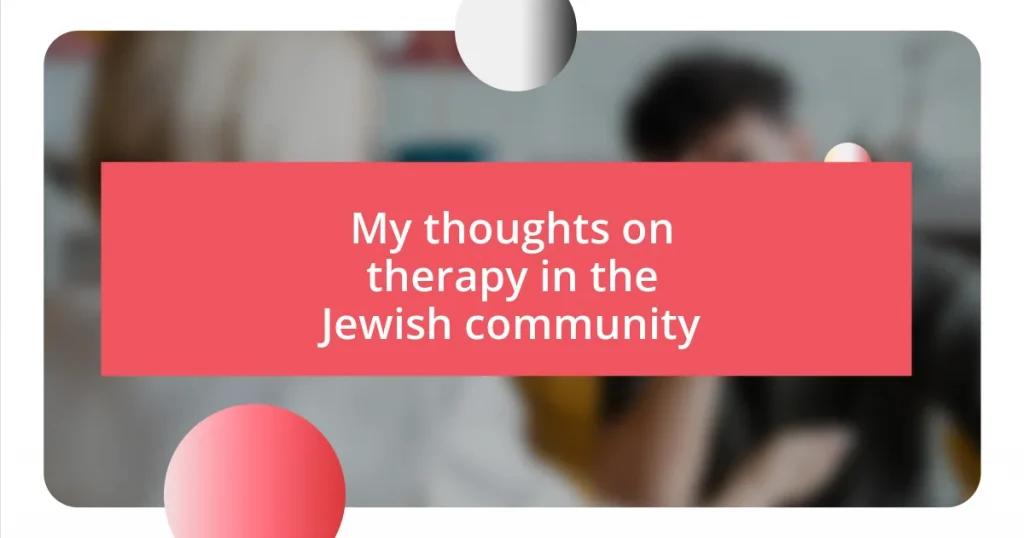Key takeaways:
- Therapy in the Jewish community is often viewed through the lens of cultural beliefs, leading to stigma and reluctance to seek help, despite the value of mental health discussions.
- Integration of faith and therapy can enhance healing, allowing individuals to connect their spiritual beliefs with mental health practices for a holistic approach.
- Resources such as community services and online directories can assist individuals in finding therapists who understand their cultural and religious backgrounds, fostering a supportive therapeutic environment.
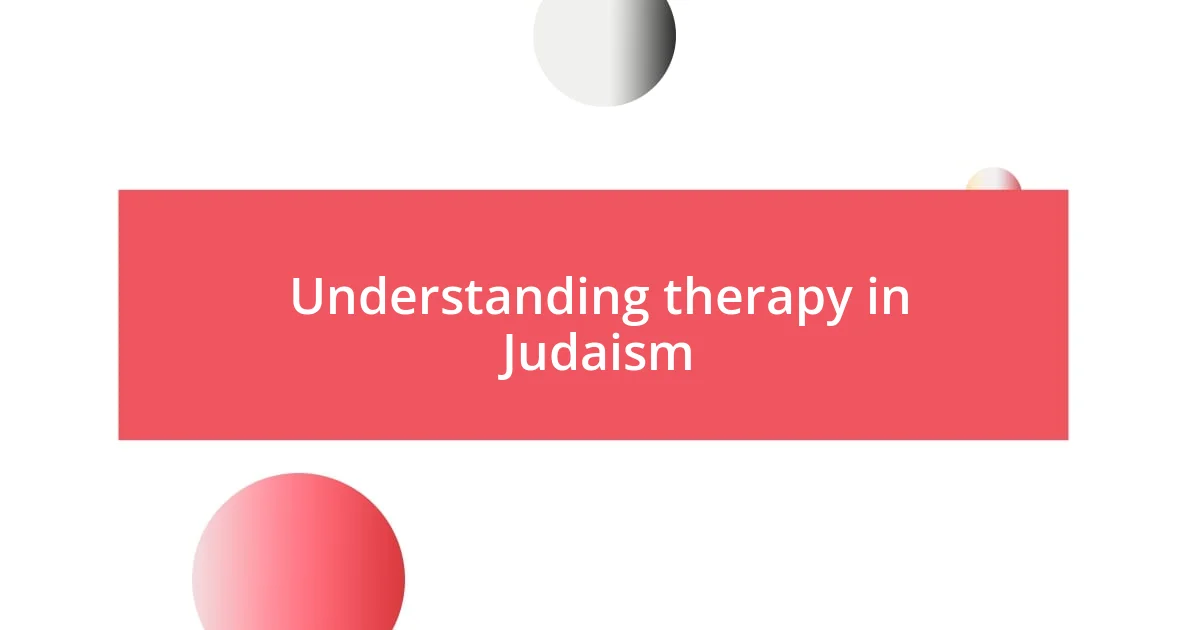
Understanding therapy in Judaism
Therapy in Judaism often intersects with deeply held beliefs and cultural perspectives. I’ve often found that many in the Jewish community struggle with the idea of seeking help outside their faith, viewing it as a form of weakness rather than an act of strength. Isn’t it ironic how, in our rich tradition of questioning and discussion, the act of seeking therapy can sometimes feel taboo?
In my experience, understanding the role of mental health within Jewish teachings can be enlightening. For example, the concept of “Heshbon HaNefesh,” or spiritual accounting, encourages self-reflection and personal growth. I remember a time when a friend and I attended a discussion on this topic, and it sparked such insightful conversations about how therapy can be aligned with our spiritual journeys, rather than seen as a deviation from them.
Moreover, the communal aspect of Judaism often plays a significant role in therapeutic practices. When I attended a therapy group specifically for Jews, the shared cultural background created an instant connection. This made me wonder, how does our shared heritage shape our understanding of mental health? Reflecting on this, I realized that discussing our struggles in a familiar context can foster immense healing and community support.
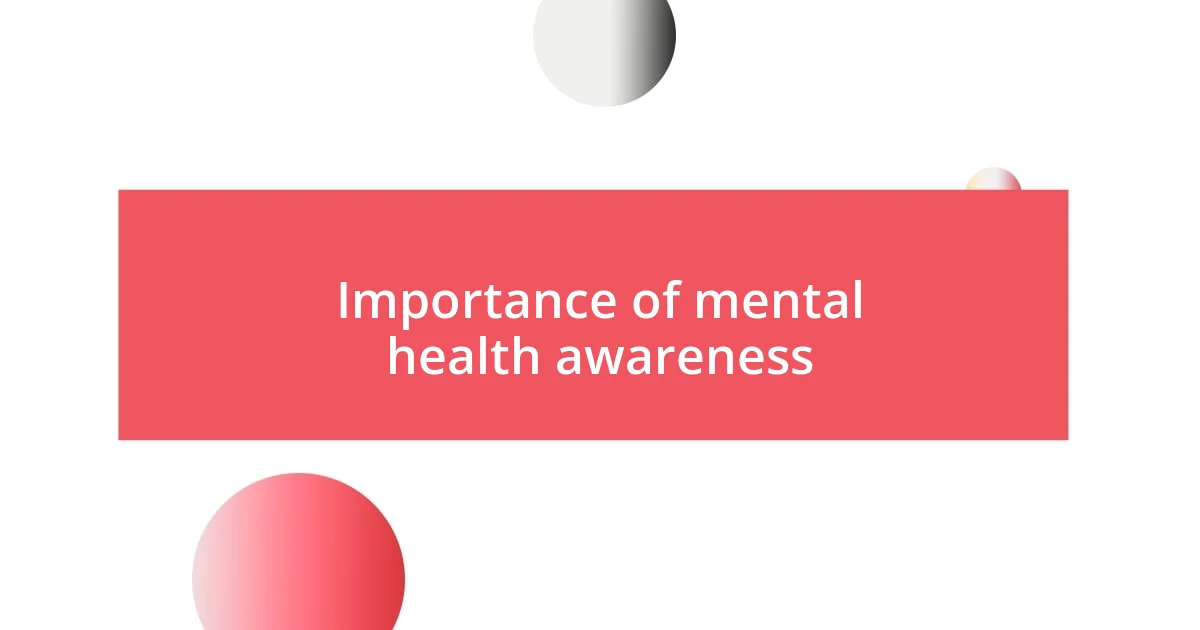
Importance of mental health awareness
Mental health awareness is increasingly critical in today’s society, and particularly within the Jewish community. I’ve seen firsthand how discussing mental health can diminish stigma and encourage individuals to seek help. For instance, during a community seminar I attended, when one person bravely shared their struggles, it inspired others to speak up too. This interconnectedness is essential; it shows that we’re not alone, which is a powerful message in any healing journey.
It’s also interesting to note how cultural factors impact acceptance and understanding of mental health issues. In my experience, there are still lingering perceptions that seeking help equates to weakness. This mindset can be detrimental, especially to those silently fighting their battles. A friend once told me how she felt shame after initiating therapy, yet once she opened up about it, she discovered many shared similar experiences. Those conversations were not just freeing; they underscored the importance of mental health awareness in breaking down barriers.
Lastly, we have a unique opportunity to reshape the narrative around mental health within our community. By fostering an environment that normalizes this dialogue, we can begin to view therapy as a vital resource, akin to physical health. I often think about how different our community could feel if we all practiced open discussions about mental well-being. Embracing this could not only help individuals but strengthen our collective resilience.
| Aspects of Mental Health Awareness | Benefits |
|---|---|
| Open Discussions | Destigmatizes seeking help |
| Cultural Understanding | Supports those struggling |
| Community Support | Fosters resilience |
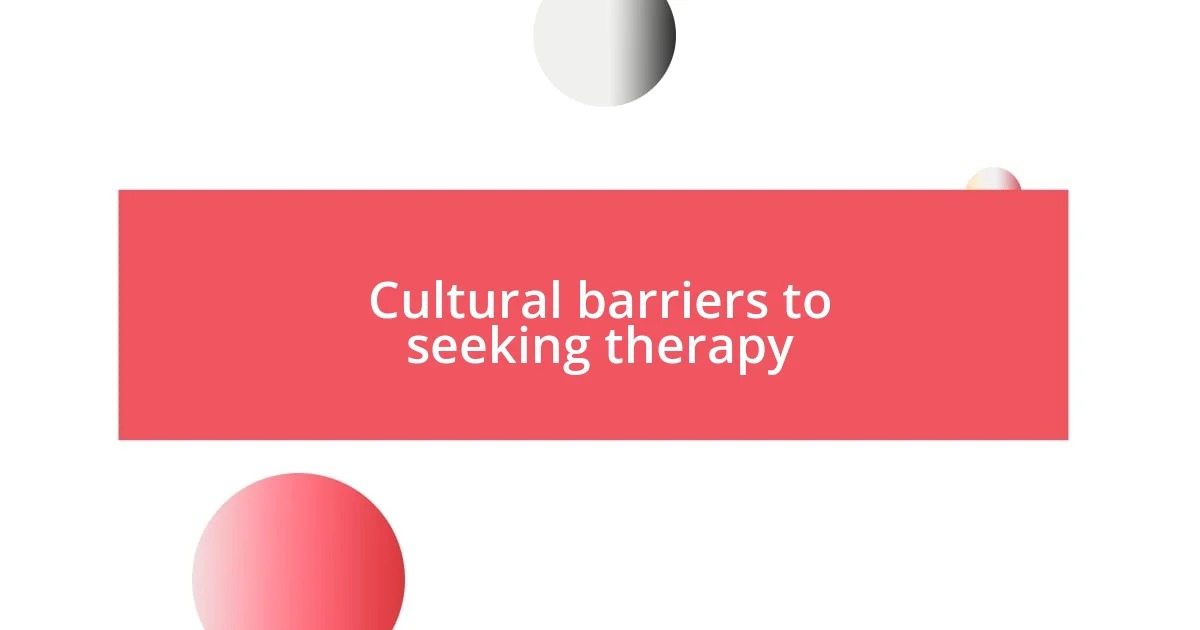
Cultural barriers to seeking therapy
In my conversations with friends and family, I’ve noticed a common thread: the fear of judgment often stands in the way of seeking therapy. Many in the Jewish community perceive discussing mental health as akin to airing dirty laundry, worrying how it will reflect on their family or themselves. It reminds me of a time when a close friend hesitated to share her therapy journey, fearing what her parents would think. It was a heartfelt conversation that highlighted how cultural expectations can weigh heavily on personal choices.
- Fear of Judgment: Worrying about community perceptions can stifle openness to therapy.
- Stigma of Weakness: There’s often a belief that seeking help suggests personal failure.
- Generational Differences: Older generations may uphold traditional views that clash with modern mental health practices.
- Religious Concerns: Some individuals might feel that turning to therapy indicates a lack of faith or reliance on spirituality.
- Support Networks: Many may feel isolated, unsure of who might empathize with their struggles.
It’s also worth noting how the strong emphasis on self-sufficiency can produce internal struggles. I remember a dinner where the topic of therapy came up, and an uncle revealed his hesitations, caught between his desire for help and his deeply ingrained belief that he should “handle it on his own.” This tension, existing between cultural pride and personal vulnerability, can deter individuals from seeking the support that could be so beneficial.
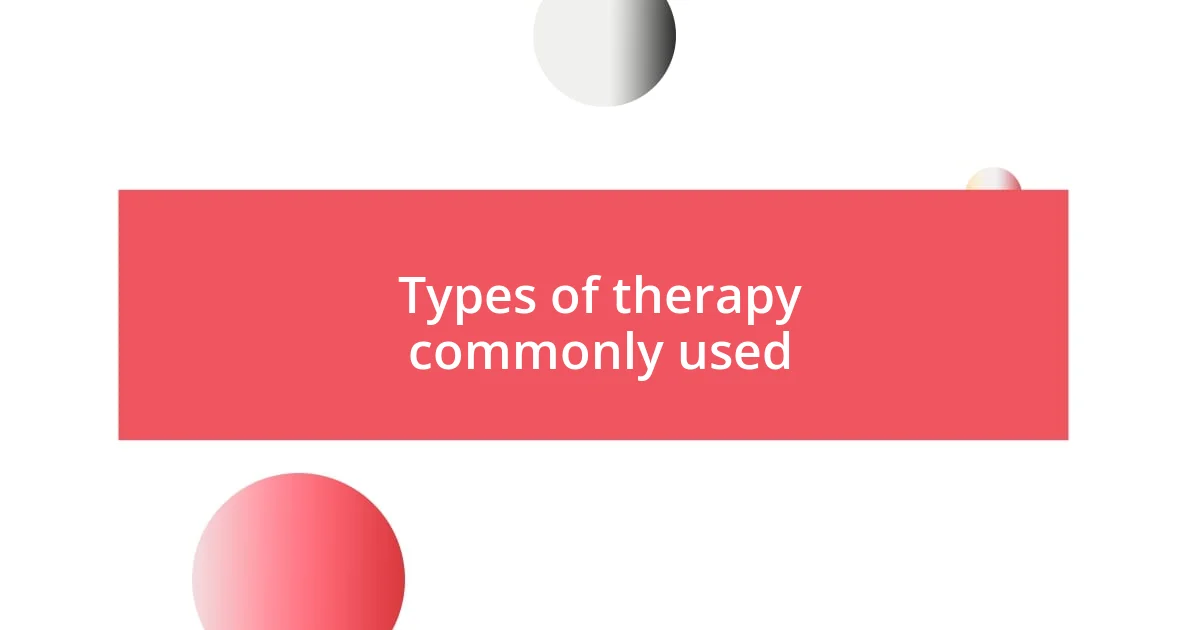
Types of therapy commonly used
One popular type of therapy often embraced in the Jewish community is cognitive-behavioral therapy (CBT). I find it particularly helpful in addressing ingrained thought patterns, which can be a significant concern for many individuals struggling with anxiety or depression. I recall a workshop where a therapist explained how CBT helps reframe negative thinking into more constructive dialogue, allowing individuals to unearth healthier ways to cope. It’s fascinating how this approach not only focuses on thoughts but also addresses behaviors, making it a holistic choice for many.
Another therapy gaining traction is family therapy, which acknowledges the significance of family dynamics in shaping mental health. I remember attending a family session with a friend who wanted to improve communication between her and her siblings. It was powerful to observe how the therapist facilitated difficult conversations, allowing each person to express emotions without fear of conflict. This approach often resonates within the Jewish community, where family ties are strong, and collective healing becomes integral to individual growth.
Group therapy also seems to be making waves, providing a shared space for individuals to connect over their experiences. I once participated in a group session and was struck by the camaraderie formed among strangers, each with unique yet relatable struggles. It made me realize how loneliness is often a battle many face—despite being surrounded by others. In that environment, I could see how the act of sharing and listening created bonds that were profoundly healing. Isn’t it amazing how vulnerability can lead to growth and connection?
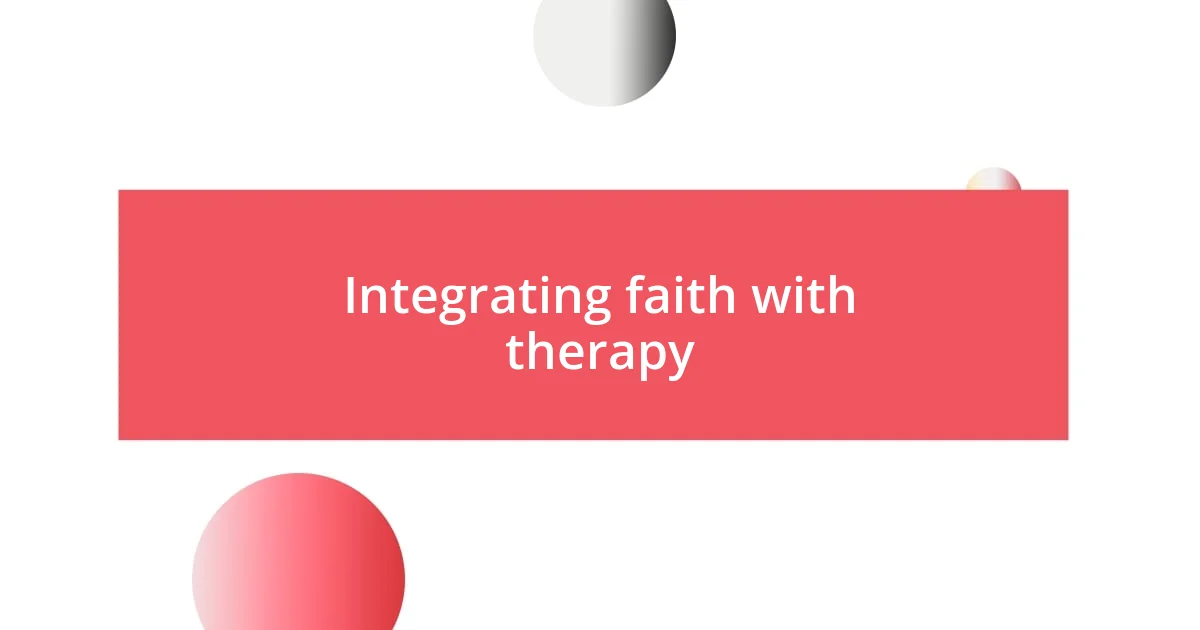
Integrating faith with therapy
When it comes to integrating faith with therapy, I’ve witnessed a unique interplay that can foster both healing and growth. For many in the Jewish community, maintaining a connection to their spirituality while seeking therapy creates a comforting bridge between modern mental health practices and ancient teachings. I remember a friend who expressed relief when she found a therapist who understood her Jewish background; it allowed her to explore her emotional struggles through the lens of her faith. Isn’t it empowering to know that our spiritual beliefs can coexist with our mental health journey?
The challenge often lies in navigating the inherent beliefs of faith that encourage resilience and self-reliance. I can recall a discussion during a Shabbat dinner where someone mentioned conflict: “Can we truly lean on therapy if we believe in divine intervention?” It struck a chord because it highlighted a common hesitation—the fear that therapy might undermine one’s faith. However, my perspective is that faith can actually be a support system, enriching the therapeutic process rather than detracting from it. When both spheres are honored, individuals often find reassurance in their holistic journey toward well-being.
Moreover, I’ve come to appreciate how community resources can facilitate this integration. In attending workshops that include spiritual guidance alongside therapeutic techniques, I’ve seen how participants feel heard on multiple levels. I remember a session where we engaged in mindfulness practices rooted in Jewish traditions, like gratitude prayers, followed by open discussions about our mental health. It was a beautiful synergy of faith and therapy, reminding me that seeking help can actually enhance one’s spiritual life. Isn’t it profound how our paths to healing can be illuminated by both faith and professional support?
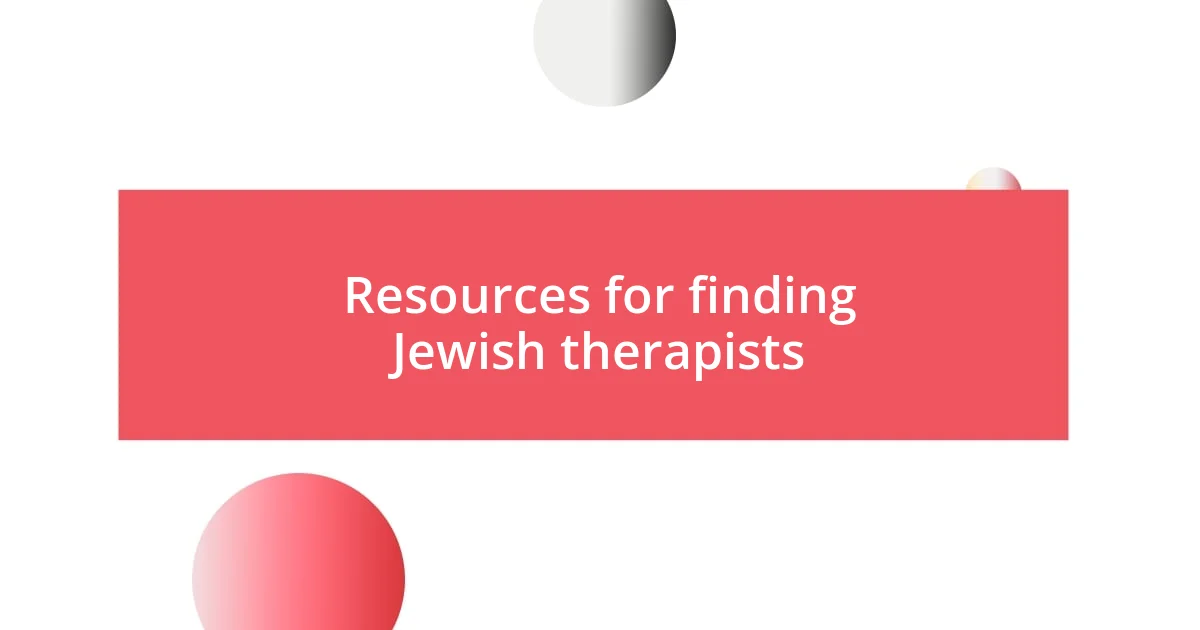
Resources for finding Jewish therapists
Finding a Jewish therapist can feel like a significant step toward mental well-being, and there are some excellent resources to help in that search. One such resource is the Jewish Board of Family and Children’s Services, which has a wonderful directory of therapists, many of whom share a common cultural understanding that can be incredibly reassuring during therapy. I remember browsing through their listings and feeling a sense of relief knowing that I could find someone who really gets the nuances of my heritage.
Another great option is to check out networks like JCS (Jewish Community Services) or Yeshiva University’s Counseling Center, both of which provide a comprehensive list of professionals specializing in Jewish therapy. When I reached out to my local community center, they connected me with a therapist who not only shared my background but also incorporated Jewish teachings into our sessions. Have you ever considered how much easier it is to open up to someone who understands your cultural references? That connection can really enhance the therapeutic experience.
Lastly, online platforms like Psychology Today allow you to filter searches for therapists based on religious affiliation. I remember logging into the site and being surprised by the number of Jewish therapists available in my area. It felt empowering to know that I had the option to select a professional who could resonate with my cultural identity. Utilizing these resources can be a comforting first step in finding the right therapeutic match for your journey.










